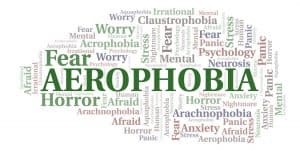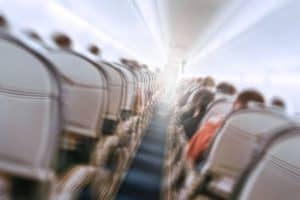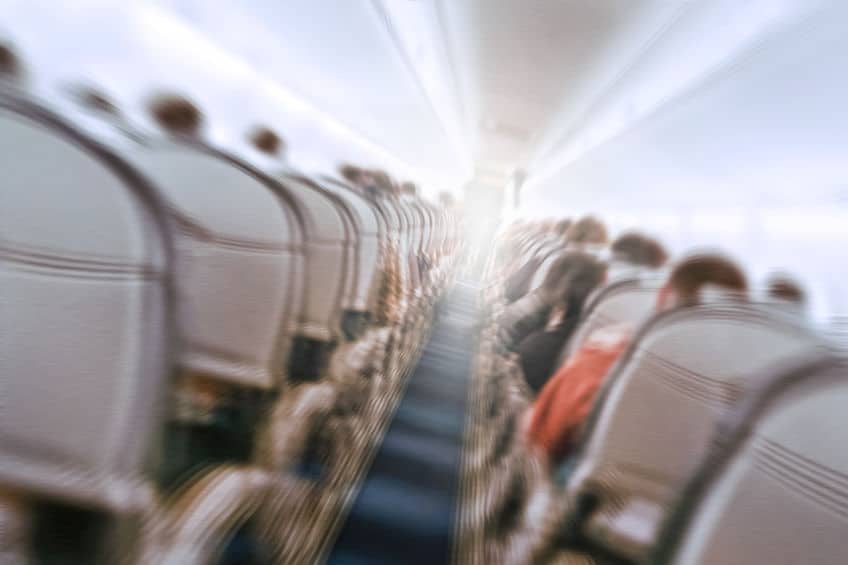Share This Article
The Fear of Flying
Let’s be honest. We live in a high-paced society, and time is a valuable commodity. Time is money they say, but it’s also precious. Take vacations for instance. Say you get a week off work, and a far-off beach is on your agenda. How are you going to get there and still make the most of your precious time?
When it comes to travel, there’s no faster mode than flight.
Whether you are on a puddle jumper, personal Cessna, or a huge flying bus like the Boeing 747, flying is the way to travel. It’s fast and it’s safe.
Some people, however, have serious issues using this convenient mode of travel. Because of fear, many cannot or will not fly. Fear of flying can put a serious crimp in any plan.

Understanding the Fear of Flying
Aerophobia, sometimes called aviophobia, is the technical term for the fear of flying.
If you suffer debilitating fear or simply discomfort, you are not alone. There are a fair number of people who would rather drive the 2,700 miles from New York to Los Angeles than even consider getting on a plane.
The fear of flying, although enough to handle on its own, may be accompanied by other fears such as the related acrophobia (fear of heights) or claustrophobia (fear of confined spaces). It is similar to the fear of being a passenger in a car where you have no control of the situation.
As many as one in four air travelers have a considerable fear of flying. This fear may come from a past bad flight experience, recent news of airline disasters, or terrorist events such as what occurred on September 11, 2001, known now as 9/11. This traumatic event was responsible for the onset of many cases of aerophobia, which is understandable. Movies and other media may also be to blame for stoking fears of flying in those susceptible.
Other underlying conditions may exacerbate your aerophobia, like having an illness for instance. Traveling with a sinus issue, inner ear problem, or even a common cold may increase the effects of your fear of flying.
The Impact of Fear of Flying
For those of us with jobs that require travel, the fear of flying can complicate life.
Imagine this: your boss needs you to travel four states away for an important meeting. But you must turn him down because of your severe acrophobia. This could cause serious issues such as job loss or lack of advancement. This may be an exaggerated situation, but you can see where problems with acrophobia may arise. These issues may be as complex and painful as not being able to travel with your family on a long-awaited trip to Disney Land to not being able to climb the career ladder.

Common Symptoms for the Fear of Flying
People suffering from aerophobia or aviophobia may show signs prior to boarding a plane or helicopter. Some may exhibit high levels of irritability, hot flashes, sweating, or defensiveness when asked if anything is wrong.
Some fear sufferers may become physical in an attempt to avoid getting on the plane. This should not be taken lightly. Try to calm the traveler down to see if the episode will pass. It is best not to force anyone to do something they fear this much. If the traveler is prescribed any form of anxiety or relaxation medication, it may be best for them to take the medication prior to arriving at the airport.*
Physical symptoms for the fear of flying may include:
- Gastrointestinal, flatulence or burping
- Nausea with vomiting
- Shaking or trembling
- Elevated heart rate
- Headache
- Hyperventilation
Psychological symptoms may include:
- Dizziness
- Extreme vertigo (sensation of spinning while stationary)
- Confusion
- Nervous
- Agitation
- Fear
What Can You Do for the Fear of Flying?

Professional Treatments
- Professional therapy
- Flight Simulators
- Hypnosis
- Self Help, proactive actions such as reading and learning about aerophobia
- Prescribed medications from your health professional only
- Over-the-counter meds such as motions sickness pills
- Combination of professional therapy and medication for serious cases
In Summary
You are not alone in your fear of flying. There are many well-known people who have issues flying such as Jennifer Aniston, who has a well-documented fear of flying; Colin Farrell; Kirsten Dunst; and the late, great Aretha Franklin. So you see, there is nothing to be ashamed of. It is a fairly common fear, and the good point is it can be dealt with.
It’s true that the fear of flying hampers many travelers worldwide. But if dealt with proactively you can limit the effects to make air travel acceptable if not enjoyable.
In the words of Ol’ Blue Eyes, Frank Sinatra, Come fly with me!
*Please note: Do not administer medication to any traveler that is not professionally prescribed.
SOURCES:
https://www.psycom.net/aerophobia-fear-of-flying/
https://dream.aero/dc/treating-aerophobia
https://www.sciencedirect.com/science/article/abs/pii/0887618588900047
Stories Submitted by Our Readers
Fear of Flying
I’m a middle-aged male that has never been on an airplane. I have a fear of the plane crashing or maybe it is just that I have no control whatsoever once we take off. I never go on a plane with family; I drive and meet them there or just make up an excuse as to why I can’t take the vacation.
I do plan on trying to fly soon; however, I will see my doctor first to get some medication.
Peter J.



